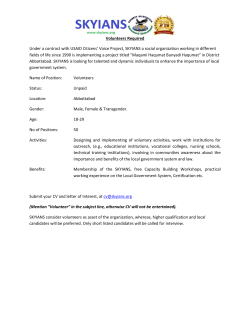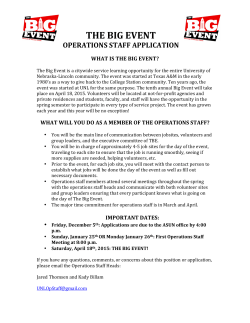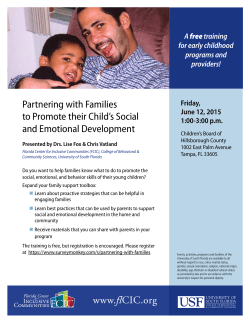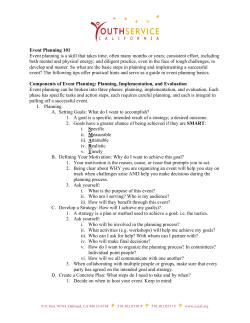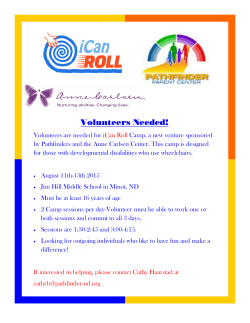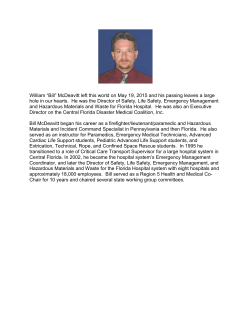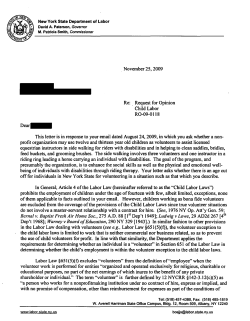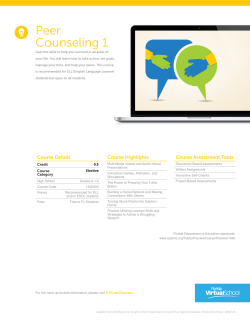
Mr. Jim Schnur - USFSP Digital Archive
“Working Memory: Celebration, Succession Planning, and Lessons Learned in Florida’s Archival Institutions” Summary of Remarks by Mr. Jim Schnur Special Collections Librarian, University of South Florida St. Petersburg Delivered in a Panel Session at the Society of Florida Archivists Annual Meeting, Miami Thursday, May 14, 1:15‐2:00 p.m., Courtyard by Marriott—Miami, Coconut Grove Overview of concerns presented by Erin Mahaney, University Archivist, Florida Institute of Technology. Specific examples of experiences by Dean DeBolt, University Archivist, University of West Florida. Address similarities between you and Dean (arrived at USFSP in 1986 as an undergraduate transfer; been associated with institution for more than half of its existence), as well as similarities between institutions (USFSP was first branch campus in the State University System of Florida, and the pioneer of the same 2+2 model that the University of West Florida fell under when it was established). For small repositories across a variety of cultural heritage institutions (archives, libraries, museums, historical organizations, etc.), when staffing models are composed of a “long arranger” and/or heavy emphasis on volunteers, the focus should be on “disaster planning.” Not all disasters are hurricanes. What happens if a longtime professional, paraprofessional, or volunteer with institutional memory leaves, is incapacitated, or perishes? The institution will never fully recover all of the knowledge it had, but without some sort of planning in place, the situation could harm the institution for years. Even with the advent of digital archives and trusted digital repositories that have a redundant, secure, off‐site presence, the loss of institutional memory may occur if steps are not taken by those associated with the institution. Concerns for faculty, staff, and professionals Examples offered based upon first‐person experiences. University archivists and special collections librarians may know a lot (asset), but what if the “true” story and “official” account differ greatly or if the story includes controversial, adversarial, or litigious elements (liability)? As employees, are we always comfortable sharing uncomfortable stories? When involved with important negotiations or signature events (such as a milestone anniversary), archival professionals often have great pressures placed upon us. In many cases, we are the living institutional record. For those of us with years of experience at a single institution (such as Dean and I), that places greater importance on our understanding of institutional heritage. When people retire, the organization changes, or other events happen, our broad knowledge fills in gaps that other sources may not address. However, we have the responsibility and must sometimes intervene to protect the historical record against competing interests (give example of the many “official” dates of USFSP’s origins—is it 1965 as a temporary overflow campus, 1968 when classes formally began, 1969 when mandating legislation was enacted, or 2006 when separate accreditation was conferred by SACS?). As institutions grow and evolve, what is our role to assure that earlier voices (retired faculty and staff, alumni from earlier incarnations of an institution, etc.) have their voices heard? (Mention the loss of files at USFSP, among other examples). For institutions with public records discoverable under Chapter 119, Laws of Florida, we must also assure that steps are established to guarantee access as required under law during times when we are away or on vacation, or during other situations when we have to address competing interests (i.e., what comes first for an academic librarian with curatorial responsibilities: a request by a student for research on a paper due later in the semester or complying with a public records request by an insistent community member?). Concerns for Volunteers, Generally Long‐term volunteers offer continuity and stability (asset), but, sometimes, if not managed well, volunteers may become problematic, cause dissension, “pull rank,” or require interventions if they consider themselves to be the “staff” or the “archivist” (liability). Volunteers need clearly outlined work assignments, supervision (for their protection, as well as the institution’s, especially if they occupy a service desk and patrons attempt to exercise pressure upon them to bend the rules), and regular feedback. When volunteers get things right and do things properly, they help us immensely (asset). However, when they get things wrong, re‐educating them can be a problem and must sometimes be handled delicately (liability). For example, a new archivist may inherit volunteers who feel that they need to exercise their ownership of collections or functions and the volunteers may also be reluctant to accept new directions or changes in practices. (Mention the Heritage Village research and how some docents were reluctant to incorporate new, historically accurate stories and instead stubbornly held onto their older, inaccurate tales.) Concerns for Friends Groups and Volunteers in Historical Societies and Similar Organizations These volunteers are essential and often keep the wheels turning (asset). (Mention the decline of staff at Heritage Village from over 25 in 2008, including an archivist and curator of collections, to two persons today—volunteers have, in effect, been managing the archives there for more than seven years. Aside from the Operations Manager for the site, institutional knowledge about the archives is now volunteer‐ driven. The Pinellas County Historical Society assists at Heritage Village but that is not a perfect solution because of the aging nature of our organization (liability). (Mention that you were PCHS president in the early 1990s when you were 27 and, although you have stepped aside a few times, you are president again today, more than 22 years later. And, in both instances, you were the youngest member of the PCHS board.) Important Things to Do We must document processes, codify practices, take advantage of technology when it is beneficial to do so, and harness the talents of volunteers in a way that best benefits the institution.
© Copyright 2025
